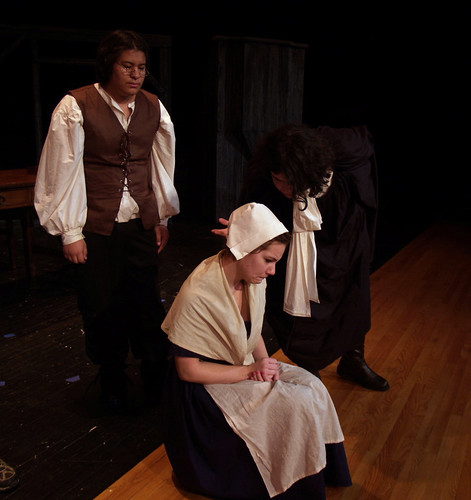Severian thinks on churchiness and churchianity in our times:
The most striking fact about the Middle Ages from a modern perspective is their love of lists, categories, forms. This is partly practical — Church art all looks the same because it has to communicate a consistent message to the aforesaid illiterate peasantry — but lots of it isn’t. They were simply obsessed with forms, with outward order, to the point that even the few true individuals were hard to tell apart — William of Ockham and Thomas Aquinas were as different as two thinkers could possibly be, but unless you’re a subject matter expert, their writings look identical.
“The Crucible” by Len Radin is licensed under CC BY-NC-SA 2.0
“Individuality,” on the other hand, comes from inward experience. What, if anything, did the medieval peasant believe when he went to Mass? Impossible to say, but one of the reasons that’s so is because the form of his “piety” was so all-encompassing. Some years back, a Jew wrote a funny book about trying to live his life by the letter of the Mosaic law. One could do the same thing with medieval Catholicism. Take a gander at the liturgical year — hardly a day goes by without a feast, a commemoration, a celebration. Do all of that, and you’ll hardly have time for anything else. They were so focused on the outward show, at least in part, because there was so much showing to do.
When the Reformation shitcanned all that, piety turned inward. There are zillions of sources for what the Reformed believed (or, at least, said they believed), because the Reformation was a middle-class pursuit and the middle classes were literate … and, crucially, had the free time to be literate. I’m guessing here, but since people are people and always have been, I’m pretty sure that your medieval peasant loved the show of his religion, because it gave him a little much-needed time off from his hourly grind of back-breaking, ragged-edge-of-survival physical labor.
Your middle-class incipient Calvinist, on the other hand, was bored to tears with stuff like “creeping to the cross” — all those billable hours lost (surely no one is surprised that Calvin, Knox, et al were all lawyers or merchants). In their vanity, they insisted it wasn’t enough to seem pious; you actually had to be pious, which meant putting the time you would’ve spent doing public penance into contemplating the state of your soul. Check out The New England Mind — once you fight through prose, you’ll see that the vaunted Puritan piety was little more than Special Snowflakism with a New Testament twist. They’re “individuals,” all right, but only because they’re as obsessed as Tumblrinas with their very own pwecious widdle selves.
The point of this isn’t just to bash Puritans, fun as that is (and as richly as they deserve it). The point is that, as Current Year America is a thoroughly Puritan nation, we have to realize just how historically contingent Puritanism really is in order to beat them.
Puritans desperately wanted to be individuals in a world that couldn’t support very many individuals. You need a lot of free time to be a Puritan, and in the 16th century free time was almost inconceivably expensive. Whatever else it was, Puritanism was gross conspicuous consumption — Puritans announced to the world that they alone had the free time to indulge in expensive educations, books, Bible study, and the endless hours worrying about whether or not it’s Biblically justified to paint the altar. In a world where most everyone still knows someone who knows someone who starved to death, that’s one hell of a statement.




